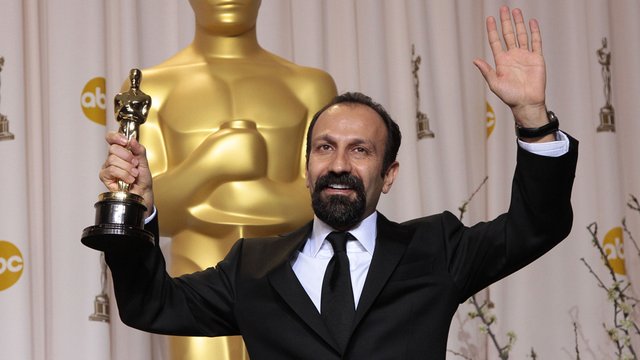Can a genius of cinema come from Iran? The case of Asghar Farhadi
Would you accept a scholarship to go to Tehran?
As my readers of Steemit already know, I live in Venezuela, a country under an authoritarian government, friend of Byelorussia, North Korea, China, Russia, Cuba, Iran. That is to say, all the countries that in a James Bond movie would be the cradle of the crazy villain that tries to conquer or destroy the world.
And the funny thing is that althoug being deeply pro-American (I was Fulbright Visiting Scholar at NYU in 2005) as well as pro-Israeli because of my Sephardic ancestry, I have worked as a scriptwriter with some official channels, and, I believe, they have respected my political positions. To the point that my boss in one of those channels offered me a scholarship to go to Tehran.
But who would accept a scholarship to go to Iran? They do not even speak Arabic, but Farsi, because they are Persians, and it is a culture so distant from ours in the West, that surely I could not make emotional or spiritual connection with them, I told myself. I would have to understand in English with the inhabitants of a country whose government dreams of building nuclear weapons to launch them against Israel, which supports terrorism on a global level, and all that imaginary that the media have put in our heads.
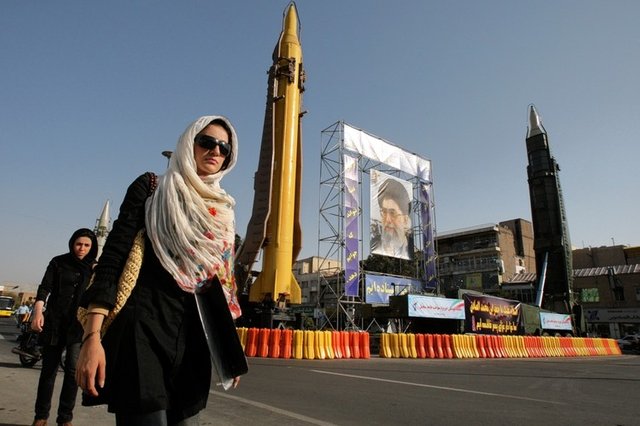
And the cinema? What the hell could a screenwriter like me learn in such a distant country, where there is no a consolidated film industry like in the United States or France?
Big mistake. I had to accept, I had to go, especially if I had the opportunity to work with Asghar Farhadi, the genius of cinema who came from Iran.
source
Is there a cinematographic development in Iran?
Yes there is, and of excellent quality. I should have remembered, before rejecting the scholarship, that in 1999 I had seen a wonderful Iranian film entitled "The Color of Paradise". His director, Majid Majidi, was the first Iranian filmmaker nominated for an Oscar.

The film, which was described as "beautiful" by The New York Times, is one of the film gems of Iranian cinema, and tells the story of Mohammad (Mohsen Ramezani), a blind child who is alone, outside a special institute in Tehran It is a moving story, implacable, that will shake you, dear reader, so if you can get it on Netflix or any Internet platform, do not miss it.
But the recent fame of Iranian cinema is due to director Asghar Farhadi. He is one of the few film directors who have won two or more times the Oscar for the best foreign film. Federico Fellini (4) won in 1956 with La Strada, in 1957 with The Nights of Cabiria, in 1963 with Fellini 8 ½ and in 1974 with Amarcord. Vittorio de Sica (2) won in 1964 with Yesterday, today and tomorrow, and in 1971 with The Garden of the Finzi-Contini. Ingmar Bergman (3) won in 1960 with The Wellspring of the Maiden, in 1961 with Behind the Mirror, and in 1983 with Fanny and Alexander.
It should be noted that Pedro Almodóvar (2) won in 1999 with Todo Sobre mi Madre -All about my mother- (best film in a foreign language) and in 2004, but the Oscar for the best original script, although it was written in Spanish, with Talk to Her.
Asghar Farhadi (2) won in 2011 with Nader and Simin, a separation, and in 2016 with Forushandeh (The Salesman).
So imagine, dear readers, to what exclusive club belongs Asghar Farhadi, the great filmmaker who came from Iran.
From A Separation to Everyone Knows
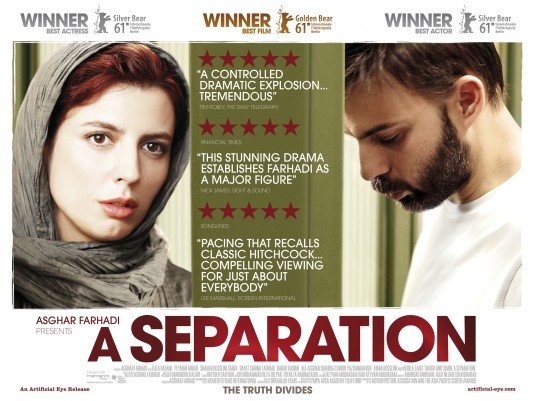
source
Asghar Farhadi was banned from filming in his country for some time, due to very strong criticism he launched against the Iranian government. However, in 2011 Nader and Simin, A Separation, was filmed in Iran, although Farhadi could have made it in France. There are autobiographical features in that story, about the difficulty of a couple to divorce in Iran, due to the pressure of the Islamic fundamentalist state against divorce. Apart from the award for best foreign language film, it was also nominated as best original script.
It is the story of a broken family, with a small child. They are faced with a difficult decision –to improve the life of their child by moving to another country, or to stay in Iran and look after a deterioriting parent who has Alzeimer’s disease.
The peculiarity of Asghar Farhadi's scripts is that they do not follow the model of the hero's journey that is usually employed in Hollywood industry films, nor the psychological dramatic arcs of European films.
A Separation is like a rollercoaster, that goes rising little by little, in an even tortuous way, towards an emotional peak that we never imagined how the hell it is going to be.
In the beginning, the actions seem trivial, like the ordinary life of anyone. They go spinning irrelevant actions after irrelevant actions, and suddenly, without knowing from or how, touché! an unforeseen but perfectly plausible action occurs, which diverts the story into an abyss. The roller coaster breaks loose, goes down at full speed, and there is no way to stop it, the adrenaline runs through our body, we are trapped in the seat, with our mouths open, stunned.
Usually, what moves those actions, what unties in downhill rollercoaster are basic passions, desire, hatred, love, ambition, lies, human misery. Farhadi achieves, through this thematic and an overwhelming work with the actors, to keep us on the edge of anguish from the dramatic turning point of his films.
It happens like this in A Separation, when the woman decides to save her child's future.
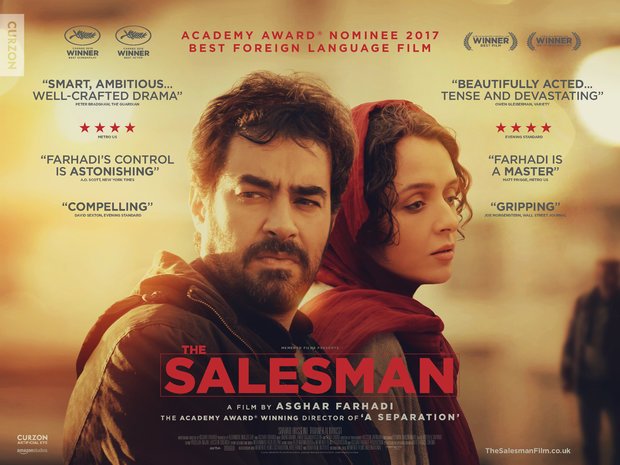
source
It also happens in Forushandeh (The Salesman). A theater group in Tehran is setting up Death of a Salesman, by Arthur Miller. A couple from the theater group move into a new apartment, and they hire someone for a minor repair. But in the interim, a sexual aggression against the wife occurs, which makes the ordered and tranquil world - within that society so conservative and strange to us - in which the protagonists lived.
The dramatic action, the pain, will grow and grow, until reaching really touching levels. Without stopping, always in crescendo, the author of the violation will be naked, in all his misery and humanity, asking for forgiveness and redemption so that his own stable world does not collapse. Is it worth destroying the world and the family of that poor devil who sinned almost out of curiosity, but who is not a monster? Is it worth doing justice to that cost? The ethical and emotional dilemma of the pair of actors breaks our soul. After watching these two films, it can be said with justice that Farhadi has developed a very personal style, a brand that you identify as soon as you see two or three minutes of any of his films.
Farhadi did not attend the Academy awards ceremony in 2017, protesting the Trump government's immigration policy against travelers from Muslim-majority countries, including Iran. It speaks very well of this author the fact that he has fought for his country and its people, even when at a certain time the Iranian government forbade him to film. But Farhadi, I think, knows how to differentiate a people from its political leaders and its government.
What we all know
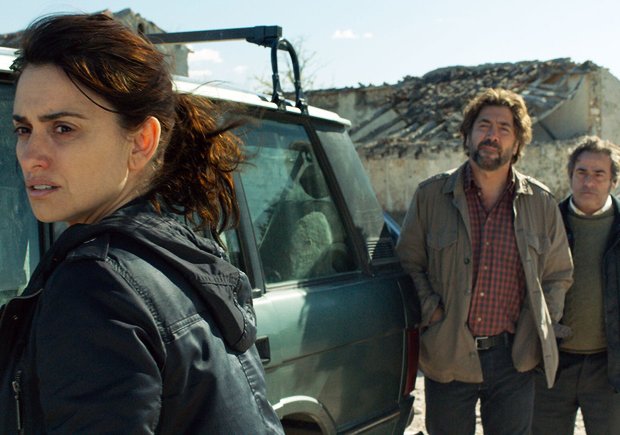
source
His most recent film was made in Spain, "Everyone knows it".
He gathered a fabulous casting: Javier Bardem and Penélope Cruz (husbands in real life and winners of an Oscar both), along with the great Argentine actor Ricardo Darín.
As in his other works, this film begins quietly, a wedding in a small town in Castilla La Mancha (Torrelaguna), the sister of the bride travels from Argentina to Spain with their two children... Her husband cannot travel with her.
In the middle of the celebration, the eldest daughter is kidnapped, and after a normal, festive start, what was a merrymaking suddenly becomes a terrible drama, as in the other Farhadi films.
Of course, the least important thing is kidnapping, that's just a trigger. But around the disappearance of the girl begin to weave threads, suspicions, hatreds and loves, which discover the secret life of that town and its inhabitants, what everyone knows, but nobody says.
Farhadi is loyal to his style, and unleashes a universe of dark, secret passions that reach sublime levels due to the high quality of the actors.
It will bwe released in the US in 1919, but I just saw it in Caracas on Thursday, and I've come across divided reviews. For some, it is another masterpiece by the great Iranian director and screenwriter. For others, it is his least accomplished work. Rotten Tomatoes values it with 60% out of 100, based on a compilation of reviews and press reviews.
As a scriptwriter, I am upset by some twists of the plot, such as the fact that the solution to the conflict is given by a character who has not had almost participation in the story, nor dramatic weight, nor sufficient background to convince us of the role that she suddenly assumes
It is, as it would be said in classical theater, a resolution through the use of the Deus ex machina, which today has very little credibility and effectiveness in dramaturgy.
But, finally, dear readers: Asghar Farhadi is a filmmaker of great talent, and all his films are worth it. If you can get them on Netflix, by cable or online, I highly recommend them.
It will be a discovery for you, I am sure, to know the work of this director who came from a country in which I did not imagine that there was such a good cinema, and for which I rejected a scholarship: Iran.
Óscar Reyes-Matute / מתת
Video recommended:
Everybody knows(Trailer)
